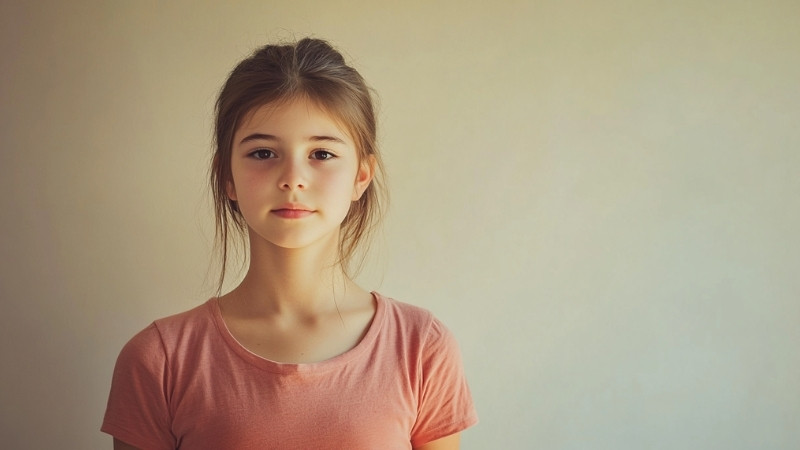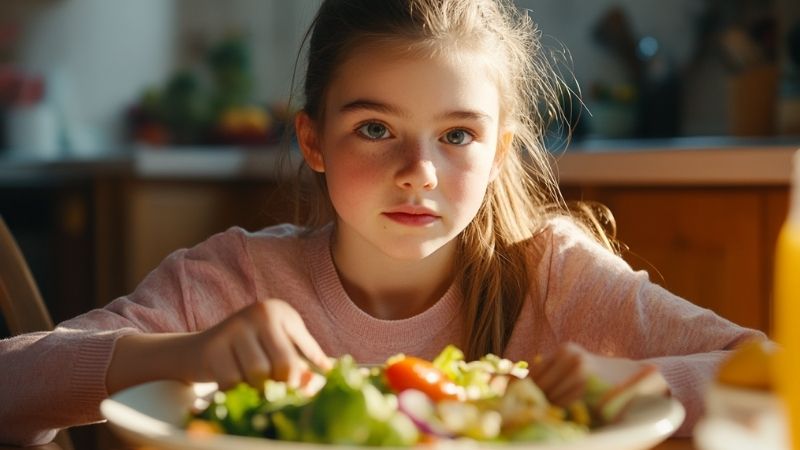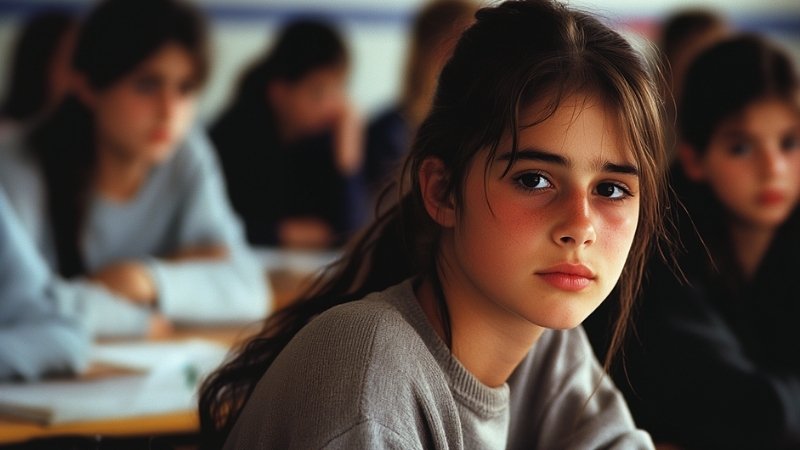Growing
up
comes
with
a
lot
of
changes,
and
weight
is
one
of
them.
Many
15-year-old
girls
wonder
if
their
weight
is
normal,
especially
when
comparing
themselves
to
friends,
social
media
images,
or
charts.
Parents
might
also
question
whether
their
child
is
growing
at
a
healthy
rate.
Numbers
on
a
scale
can
feel
like
a
big
deal,
but
they
do
not
tell
the
full
story.
Each
body
is
different,
and
weight
naturally
shifts
due
to
growth,
activity
levels,
and
genetics.
Instead
of
focusing
on
a
single
“perfect”
number,
it
is
more
useful
to
understand
the
range
of
healthy
weights
and
the
factors
that
influence
them.
Looking
at
the
most
recent
data
for
2025,
a
clear
picture
emerges
of
what
is
considered
an
average
weight
for
a
15-year-old
girl.
However,
numbers
alone
are
not
the
best
measure
of
health.
It
is
about
balance,
well-being,
and
recognizing
that
no
two
bodies
develop
in
the
same
way.
Key
Takeaways
-
Average
weight
for
a
15-year-old
girl
ranges
from
85
to
165
lbs
depending
on
height. -
Nearly
80%
of
teenage
girls
feel
unhappy
with
their
bodies
due
to
social
pressures
and
media
influence.
Weight
Ranges
for
a
15-Year-Old
Girl
Based
on
Height

Healthy
weight
isn’t
a
number—it’s
a
range.
Focus
on
strength,
not
the
scale!
Taller
girls
naturally
weigh
more
due
to
bone
structure
and
muscle
mass,
while
shorter
individuals
tend
to
weigh
less.
Weight
is
not
a
fixed
number
but
rather
a
range
influenced
by
body
composition,
genetics,
and
lifestyle.
|
Height (inches) |
Weight Range (lbs) |
|---|---|
| 58 | 85-105 |
| 59 | 90-110 |
| 60 | 95-115 |
| 61 | 100-120 |
| 62 | 105-125 |
| 63 | 110-130 |
| 64 | 115-135 |
| 65 | 120-140 |
| 66 | 125-145 |
| 67 | 130-150 |
| 68 | 135-155 |
| 69 | 140-160 |
| 70 | 145-165 |
Weight
varies
significantly
among
individuals
due
to
muscle
mass,
body
fat
percentage,
and
growth
spurts.
A
15-year-old
girl
with
a
more
athletic
build
may
weigh
more
than
someone
of
the
same
height
with
a
different
body
composition.
The
goal
should
always
be
overall
health
rather
than
fitting
into
a
specific
number.
BMI
vs.
Healthy
Weight
–
What
Really
Matters?
Many
people
rely
on
Body
Mass
Index
(BMI)
to
determine
if
their
weight
is
in
a
healthy
range,
but
BMI
is
not
always
the
best
way
to
measure
overall
health.
The
body
of
a
15-year-old
girl
is
still
developing,
and
weight
alone
does
not
determine
fitness
or
well-being.
How
BMI
Is
Calculated
BMI
is
a
simple
formula
that
compares
weight
to
height.
It
is
calculated
as:
BMI
=
(Weight
in
pounds
÷
Height
in
inches²)
×
703
The
Centers
for
Disease
Control
and
Prevention
(CDC)
provides
BMI
percentiles
for
teenagers
since
their
bodies
are
still
growing.
According
to
general
guidelines:
-
Below
5th
percentile
–
Underweight -
5th
to
85th
percentile
–
Healthy
weight -
85th
to
95th
percentile
–
Overweight -
Above
95th
percentile
–
Obese
Why
BMI
Is
Not
Always
Accurate
BMI
does
not
measure
body
fat,
muscle
mass,
or
bone
density.
A
girl
who
is
active
in
sports
may
have
a
higher
BMI
due
to
muscle
mass,
but
that
does
not
mean
she
is
overweight.
Similarly,
someone
with
a
lower
BMI
may
have
higher
body
fat
and
less
muscle,
which
could
impact
health
in
other
ways.
Better
Ways
to
Assess
Health
-
Waist-to-height
ratio
–
A
better
indicator
of
fat
distribution. -
Activity
level
–
Regular
exercise
and
movement
contribute
to
good
health. -
Nutrition
–
A
balanced
diet
with
enough
nutrients
matters
more
than
weight
alone. -
Energy
levels
and
overall
well-being
–
Feeling
strong
and
energetic
is
more
important
than
hitting
a
specific
number.
Should
a
15-Year-Old
Worry
About
BMI?
Doctors
use
BMI
as
a
general
screening
tool,
but
it
should
not
cause
stress
or
comparison
with
others.
Growth
patterns,
genetics,
and
lifestyle
all
affect
weight,
and
numbers
alone
do
not
tell
the
full
story.
If
there
are
concerns
about
weight,
it
is
better
to
focus
on
healthy
habits
rather
than
strict
BMI
categories.
When
to
Be
Concerned
About
Weight
Changes

Sudden
weight
changes
at
15?
Pay
attention
to
your
body!
Weight
fluctuations
are
normal
at
15,
but
rapid
or
extreme
changes
may
signal
a
problem.
Growth,
metabolism,
and
hormones
affect
weight,
but
sudden
shifts
need
attention.
Warning
Signs
of
Unhealthy
Weight
Loss
-
Extreme
fatigue,
weakness,
or
dizziness -
Loss
of
appetite
or
frequent
illness -
Irregular
periods
or
fainting
spells
Possible
Causes
-
Overexercising
or
undereating -
Thyroid
issues,
diabetes,
or
digestive
problems -
Anxiety,
depression,
or
eating
disorders
Warning
Signs
of
Unhealthy
Weight
Gain
-
Sudden
increase
in
clothing
size -
Constant
tiredness
or
sluggishness -
Shortness
of
breath
during
daily
activities
Possible
Causes
-
Hormonal
changes
or
thyroid
imbalances -
Low
activity
levels
and
poor
diet -
Insulin
resistance
or
other
medical
conditions
When
to
See
a
Doctor
Extreme
weight
changes
with
other
symptoms
need
medical
attention.
A
doctor
can
assess
metabolism,
nutrition,
and
overall
health
to
ensure
a
balanced
approach
to
weight
and
well-being.
The
Role
of
Nutrition
and
Exercise
at
15

Good
food
and
regular
movement
are
key
for
healthy
growth
at
15
A
15-year-old
girl
does
not
need
to
count
every
calorie
or
follow
strict
diet
rules.
Eating
enough
of
the
right
foods
keeps
the
body
strong
and
growing
the
way
it
should.
Protein
helps
build
muscle.
Healthy
fats
keep
hormones
in
balance.
Carbs
fuel
the
brain
and
body.
Skipping
meals
or
cutting
out
entire
food
groups
does
more
harm
than
good.
Drinking
water
matters
too.
Not
getting
enough
can
make
you
feel
tired,
dizzy,
or
constantly
hungry
when
your
body
actually
needs
hydration.
Exercise
does
not
mean
exhausting
workouts
or
spending
hours
sweating.
Moving
every
day
makes
a
difference.
Walking,
dancing,
playing
a
sport,
or
even
stretching
keeps
muscles
strong
and
weight
in
a
healthy
range.
Sitting
too
much
slows
metabolism
and
leads
to
unnecessary
weight
gain.
A
mix
of
good
food
and
regular
movement
keeps
everything
running
the
way
it
should.
Body
Image
and
Social
Pressures
in
2025

Social
media
pressure
and
unrealistic
beauty
standards
are
impacting
body
image
and
mental
health
Studies
show
that
around
half
of
13-year-old
girls
are
unhappy
with
their
bodies,
and
this
number
jumps
to
nearly
80%
by
age
17.
Many
report
feeling
pressure
from
social
media,
comparing
themselves
to
unrealistic
images,
and
even
restricting
diets
as
a
result.
[1]
The
Impact
of
Social
Media
Teenagers
today
are
constantly
exposed
to
edited
and
filtered
images.
A
large
percentage
of
them
admit
that
social
media
increases
their
body
concerns.
Many
feel
ashamed
of
how
they
look
after
scrolling
through
feeds
filled
with
unrealistic
beauty
standards.
This
pressure
leads
some
to
develop
unhealthy
relationships
with
food,
exercise,
and
self-worth.
[2]
Cyberbullying
Online
bullying
adds
another
layer
of
stress.
Nearly
all
teenage
girls
experience
some
form
of
cyberbullying,
with
most
cases
centered
on
appearance.
Many
affected
girls
report
considering
extreme
changes,
such
as
dieting
or
cosmetic
procedures,
just
to
fit
societal
expectations.
[3]
Unrealistic
Beauty
Standards
in
Media
Movies,
TV
shows,
and
advertisements
reinforce
narrow
beauty
ideals.
A
significant
percentage
of
teenage
girls
say
they
worry
about
their
bodies
because
of
celebrities
and
media
portrayals.
These
images
often
set
impossible
expectations,
leading
to
negative
self-comparisons
and
low
self-esteem.
[4]
Mental
Health
Consequences
The
weight
of
body
image
concerns
goes
beyond
appearance.
Research
links
social
media
pressure
to
rising
depression
and
anxiety
among
teenagers.
The
growing
rates
of
self-doubt,
stress,
and
even
suicidal
thoughts
highlight
the
need
for
stronger
support
systems.
[5]
Bottom
Line
No
chart,
trend,
or
social
pressure
defines
the
right
weight
for
a
15-year-old
girl.
Bodies
grow
at
their
own
pace.
Strength,
energy,
and
feeling
good
matter
more
than
a
number
on
a
scale.
Eating
enough
of
the
right
foods
fuels
growth.
Moving
every
day
keeps
the
body
strong.
Stressing
over
unrealistic
beauty
standards
leads
nowhere.
Real
confidence
comes
from
knowing
health
is
not
about
looking
a
certain
way.
It
is
about
living
in
a
body
that
feels
right.
If
weight
concerns
ever
feel
overwhelming,
a
doctor
can
help
without
judgment.
The
goal
is
not
perfection.
It
is
balance,
strength,
and
feeling
like
yourself.
References
-
Break
Binge
Eating
–
Body
Image
Statistics
2024:
57+
Shocking
Facts
&
Stats -
Ballard
Brief
–
The
Link
Between
Social
Media
and
Body
Image
Issues
Among
Youth
in
the
United
States -
Pew
Research
Center
–
A
Majority
of
Teens
Have
Experienced
Some
Form
of
Cyberbullying -
International
Journal
of
Cyber
Behavior,
Psychology,
and
Learning
–
Effect
of
Mass
Media
on
Body
Image
and
Self-Esteem
of
Teenage
Girls -
Child
Mind
Institute
–
Does
Social
Media
Use
Cause
Depression?